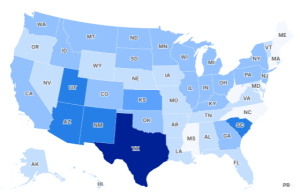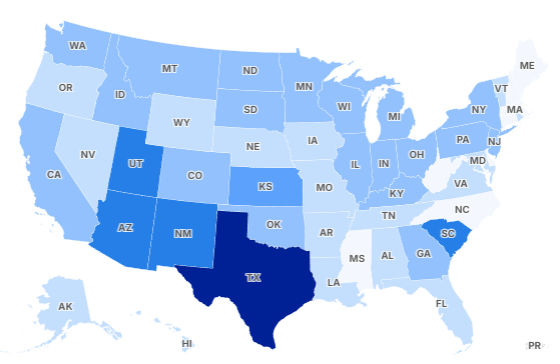President Donald Trump has once again ignited fierce national debate with a new proposal that critics say could fundamentally alter the balance of political power, disrupt federal funding models, and deepen divisions across the country. In a post shared on his social media platform Truth Social, the 47th President of the United States announced that he has directed the Department of Commerce to initiate a new version of the U.S. Census—one that would explicitly exclude undocumented immigrants from the population count.
“I have instructed our Department of Commerce to immediately begin work on a new and highly accurate CENSUS based on modern-day facts and figures,” Trump wrote. “Importantly, using the results and information gained from the Presidential Election of 2024. People who are in our Country illegally WILL NOT BE COUNTED IN THE CENSUS. Thank you for your attention to this matter!”
While the post was brief, its implications are far-reaching—and for many, deeply alarming.
A Radical Departure from Constitutional Norms?
The U.S. Constitution mandates that a national census be conducted every ten years. Since 1790, the Census Bureau has been tasked with counting all residents in the United States—regardless of immigration status. The data collected plays a critical role in determining congressional representation, allocating federal funding, and informing key decisions on infrastructure, education, healthcare, and more.
Trump’s announcement marks a potential shift away from this inclusive standard. By proposing to exclude undocumented immigrants from the population tally, the administration is challenging centuries of precedent, and possibly the constitutional foundation of the census itself.
Critics have been quick to point this out. “The census is not a political tool,” said John Bisognano, president of the National Democratic Redistricting Committee, in an interview with NPR. “What he’s trying to do is completely reshape the American electorate. He wants to make people who voted for him and look like him more representative—with more power and a bigger vote share.”
High Stakes for Representation and Federal Funding
The most immediate consequence of such a change would be on the apportionment of congressional seats in the U.S. House of Representatives. Census data determines how those 435 seats are divided among the states. By excluding undocumented immigrants—estimated by the Pew Research Center to number around 11 million as of 2022—several states could see significant shifts in political power.
According to past projections, had only legal citizens been counted in the 2020 Census, states like California, Texas, and Florida would have lost one congressional seat and Electoral College vote each. Meanwhile, states such as Alabama, Minnesota, and Ohio would have gained one.
In other words, Trump’s proposal could benefit red and swing states at the expense of more diverse, heavily populated blue states.
The potential funding implications are also staggering. Federal programs use census data to distribute over $1.5 trillion annually. This includes money for schools, public transportation, healthcare, and emergency services. Bisognano warned that “dramatic drops in federal funding” could hit states like Texas and Florida under Trump’s proposed changes.
Public Reaction: Outrage, Skepticism, and Division
The response online was swift and polarized. Many expressed outrage, calling the proposal “sickening” and accusing the administration of weaponizing the census to serve political aims.
“I extensively use census data in my job,” one person commented. “I figured it was only a matter of time before he came for it. This is infuriating and sickening.”
Others highlighted the logistical and legal hurdles such a move would face. “Someone tell mister efficiency a census costs ten billion dollars,” one user wrote. Another added, “This takes years and even then must go through Congress. Even Republicans won’t touch this.”
A Reddit user summed up the skepticism: “They’re just going to fudge the numbers then send it off to Congress, where it’ll stall. Release the Epstein files, my dude—it’s just easier at this point.”
Still, a vocal segment of Trump supporters praised the move. “A new census count going forward with ONLY U.S. citizens is essential,” one user wrote on X (formerly Twitter). Another added, “Protecting elections means counting only citizens. This bill strengthens fairness and voter integrity.”
Legal and Political Hurdles Ahead
While Trump’s announcement has energized supporters and alarmed critics, the proposal is far from becoming policy. Any change to the methodology of the census would face steep legal challenges, given its constitutional mandate to count all “persons” residing in the U.S.
Moreover, Congress would likely have to approve the changes or the substantial funding required to conduct a new census outside the normal ten-year cycle. With divided government and bipartisan skepticism about the feasibility and legality of the proposal, Trump’s plan could end up more symbolic than practical—for now.
Still, the move serves as a clear signal of Trump’s intentions heading into the latter half of his second term: assert political control, reshape the electoral map, and reframe American identity through a narrower, citizen-first lens.
Whether the courts or Congress allow him to succeed remains to be seen—but one thing is certain: the fight over who counts in America is far from over.

Emily Johnson is a critically acclaimed essayist and novelist known for her thought-provoking works centered on feminism, women’s rights, and modern relationships. Born and raised in Portland, Oregon, Emily grew up with a deep love of books, often spending her afternoons at her local library. She went on to study literature and gender studies at UCLA, where she became deeply involved in activism and began publishing essays in campus journals. Her debut essay collection, Voices Unbound, struck a chord with readers nationwide for its fearless exploration of gender dynamics, identity, and the challenges faced by women in contemporary society. Emily later transitioned into fiction, writing novels that balance compelling storytelling with social commentary. Her protagonists are often strong, multidimensional women navigating love, ambition, and the struggles of everyday life, making her a favorite among readers who crave authentic, relatable narratives. Critics praise her ability to merge personal intimacy with universal themes. Off the page, Emily is an advocate for women in publishing, leading workshops that encourage young female writers to embrace their voices. She lives in Seattle with her partner and two rescue cats, where she continues to write, teach, and inspire a new generation of storytellers.









